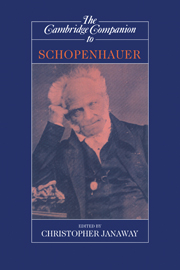Book contents
- Frontmatter
- Introduction
- 1 Schopenhauer on the Self
- 2 Schopenhauer and Knowledge
- 3 The Fourfold Root
- 4 Schopenhauer, Kant, and the Methods of Philosophy
- 5 Will and Nature
- 6 The Influences of Eastern Thought on Schopenhauer’s Doctrine of the Thing-in-Itself
- 7 Ideas and Imagination
- 8 Schopenhauer’s Narrower Sense of Morality
- 9 Schopenhauer on Death
- 10 Schopenhauer’s Pessimism
- 11 Nietzsche, Schopenhauer, and Dionysus
- 12 Schopenhauer, Will, and the Unconscious
- 13 Schopenhauer and Wittgenstein
- Bibliography
- Index
12 - Schopenhauer, Will, and the Unconscious
Published online by Cambridge University Press: 28 May 2006
- Frontmatter
- Introduction
- 1 Schopenhauer on the Self
- 2 Schopenhauer and Knowledge
- 3 The Fourfold Root
- 4 Schopenhauer, Kant, and the Methods of Philosophy
- 5 Will and Nature
- 6 The Influences of Eastern Thought on Schopenhauer’s Doctrine of the Thing-in-Itself
- 7 Ideas and Imagination
- 8 Schopenhauer’s Narrower Sense of Morality
- 9 Schopenhauer on Death
- 10 Schopenhauer’s Pessimism
- 11 Nietzsche, Schopenhauer, and Dionysus
- 12 Schopenhauer, Will, and the Unconscious
- 13 Schopenhauer and Wittgenstein
- Bibliography
- Index
Summary
It is a commonplace of the history of ideas that there is an extremely close relationship between Schopenhauer and Freud. Nietzsche too is often cited as a philosophical precursor of Freud, but the proto- Freudian elements in his thought are naturally regarded as derived from his Schopenhauerian legacy.
The question of influence, or at any rate continuity, between Schopenhauer and Freud is of interest and importance on its own account, but it has further dimensions. Freud's life and writings are subject to continued interrogation, and his claims for the originality of psychoanalysis are regularly disputed. Whether or not enquiry into the origins of psychoanalysis can do anything to resolve the abiding controversy surrounding the discipline, they at least promise to increase our understanding by helping us to see what makes a conception of the unconscious specifically psychoanalytic.
On Schopenhauer’s side, the interest is this. Indisputably, Freud’s ideas have sunk deep into the natural consciousness of twentiethcentury Western culture. If Freud’s central theoretical concept does descend ultimately from Schopenhauer, then this is a reason, or a further reason, for regarding Schopenhauer’s philosophy as having a special importance for our self-understanding.
- Type
- Chapter
- Information
- The Cambridge Companion to Schopenhauer , pp. 375 - 421Publisher: Cambridge University PressPrint publication year: 1999
- 8
- Cited by



